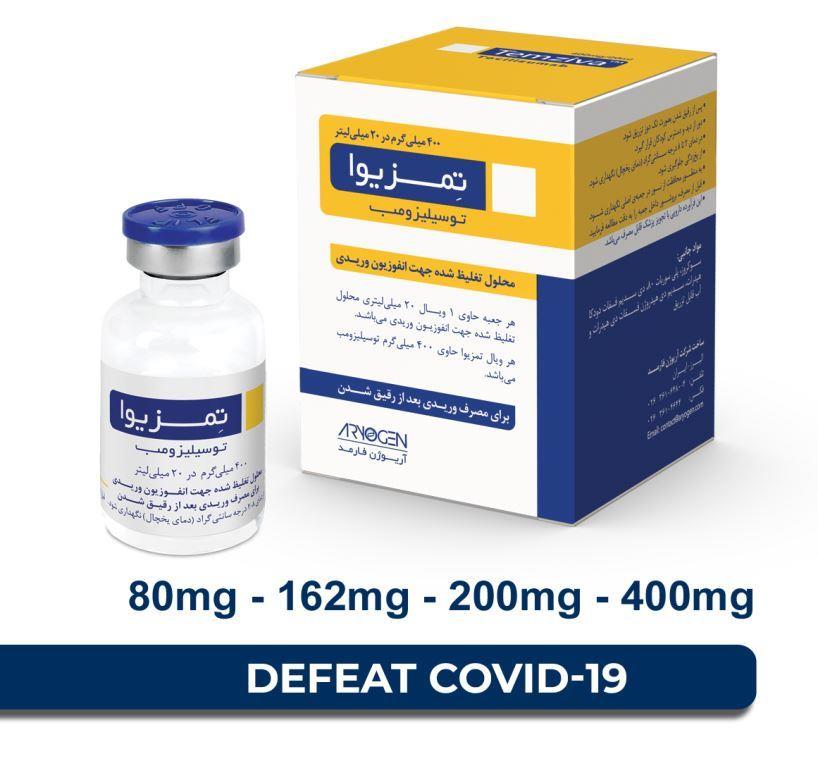آخرین به روزرسانی ها

نتایج مطالعه بالینی انجام شده در مورد داروی توسیلیزومب در مجله Lancet
نتایج چندین مطالعه ی بالینی انجام شده در مورد داروی توسیلیزومب که اخیرا در مجله ی lancet نیز به چاپ رسیده است، نشان می دهد که این دارو باعث کاهش مرگ و میر، کاهش مدت زمان بستری شدن در بیمارستان و همچنین کاهش نیاز به دستگاه های تهویه ی مکانیکی در بیماران بستری مبتلا به Covid-19 با علائم کاهش سطح اکسیژن و افزایش التهاب سیستمیک میگردد.
Data from RECOVERY trial show tocilizumab improved survival and clinical outcomes in hospitalised COVID-19 patients with hypoxia and systemic inflammation
Findings published in The Lancet from the Randomised Evaluation of COVID-19 Therapy (RECOVERY) trial showed that treatment with tocilizumab improved survival and other clinical outcomes in hospitalised coronavirus disease 2019 (COVID-19) patients with hypoxia and systemic inflammation. These benefits were seen regardless of the amount of respiratory support and were additional to the benefits of systemic corticosteroids
“The RECOVERY trial is the largest randomised trial of the effect of tocilizumab in hospitalised patients with COVID-19. We found that in 4,116 COVID-19 patients with hypoxia and a raised C-reactive protein [CRP ≥75 mg/L], tocilizumab reduced 28-day mortality, increased the probability of discharge within 28 days, and, among patients who were not receiving invasive mechanical ventilation at randomisation, reduced the probability of progression to the composite outcome of invasive mechanical ventilation or death,” reported Peter W Horby, RECOVERY Central Coordinating Office, Oxford, United Kingdom, and colleagues
Between April 23, 2020, and January 24, 2021, 4,116 of 21,550 patients enrolled into the RECOVERY trial were included in the assessment of tocilizumab, including 3,385 (82%) patients receiving systemic corticosteroids. Patients were randomly assigned to the usual standard of care alone (n = 2,094) or usual standard of care plus tocilizumab at a dose of 400 mg–800 mg (depending on weight) given intravenously (n = 2,022). A second dose could be given 12–24 hours later if the patient’s condition had not improved
The mean age of these patients was 63.6 years and the median CRP was 143 (IQR 107–204) mg/L. At randomisation, 562 (14%) patients were receiving invasive mechanical ventilation, 1,686 (41%) were receiving non-invasive respiratory support (including high-flow nasal oxygen, continuous positive airway pressure, and non-invasive ventilation), and 1,868 (45%) were receiving no respiratory support other than simple oxygen therapy
The primary outcome was all-cause mortality, while secondary outcomes included time to discharge from hospital, and a composite outcome of invasive mechanical ventilation (including extracorporeal membrane oxygenation) or death within 28 days (among those not receiving invasive mechanical ventilation at randomisation)
Study data showed that treatment with tocilizumab was associated with a reduced 28-day mortality, whereby 621 (31%) patients treated with tocilizumab died within 28 days compared to 729 (35%) patients allocated to usual care (rate ratio [RR] 0.85, 95% confidence interval [CI] 0.76–0.94, P = 0.0028). Consistent results were observed in all prespecified subgroups of patients, including those receiving systemic corticosteroids
Additionally, a greater probability of discharge from hospital within 28 days was observed among patients treated with tocilizumab compared with those who received usual care only (57% vs 50%; RR 1.22, 95% CI 1.12–1.33, P <0.0001). Meanwhile, among patients who were not on invasive mechanical ventilation at baseline, those who received tocilizumab were less likely to reach the composite endpoint of invasive mechanical ventilation or death (35% vs 42%; RR 0.84; 95% CI 0.77–0.92, P < 0.0001) compared to those who did not receive tocilizumab
“Since mid-2020, eight randomised, controlled trials of tocilizumab for the treatment of COVID-19 have been reported. These include seven small trials (fewer than 100 deaths in each) and the somewhat larger REMAP-CAP trial, which recruited critically ill patients with COVID-19, over 99% of whom required non-invasive respiratory support or invasive mechanical ventilation. Taken together, these previous trials did not show a significant mortality benefit for treatment with tocilizumab (death rate ratio 0.89, 95% CI 0.72–1.11),” the authors wrote
“The RECOVERY trial contains around four times as much information as all the previous trials combined. When all nine trials are considered together, allocation to tocilizumab is associated with a significant 14% proportional reduction in 28-day mortality,” the authors added
“The RECOVERY trial has shown that for patients hospitalised with severe COVID-19, treatment with tocilizumab reduces mortality, increases the chances of successful hospital discharge, and reduces the chances of requiring invasive mechanical ventilation. These benefits are additional to those previously reported for dexamethasone,” the authors concluded


